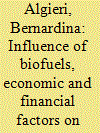| Srl | Item |
| 1 |
ID:
121739


|
|
|
|
|
| Publication |
2013.
|
| Summary/Abstract |
Under near-zero US interest rates, the international dollar standard malfunctions. Emerging markets with naturally higher interest rates are swamped with hot money inflows. Emerging market central banks intervene to prevent their currencies from rising precipitately. They lose monetary control and domestic prices begin inflating. Primary commodity prices rise worldwide unless interrupted by an international banking crisis. This cyclical inflation on the dollar's periphery only registers in the US core consumer price index with a long lag. The zero interest rate policy also fails to stimulate the US economy as domestic financial intermediation by banks and money market mutual funds is repressed. Because China is forced to keep its interest rates below market-clearing levels, it also suffers from financial repression, although in a form differing from that in the USA.
|
|
|
|
|
|
|
|
|
|
|
|
|
|
|
|
| 2 |
ID:
132657


|
|
|
|
|
| Publication |
2014.
|
| Summary/Abstract |
Biofuels production has experienced rapid growth worldwide as one of the several strategies to promote green energy economies. Indeed, climate change mitigation and energy security have been frequent rationales behind biofuel policies, but biofuels production could generate negative impacts, such as additional demand for feedstocks, and therefore for land on which to grow them, with a consequent increase in food commodity prices. In this context, this paper examines the effect of biofuels and other economic and financial factors on daily returns of a group of commodity futures prices using Generalized Autoregressive Conditional Heteroskedasticity (GARCH) family models in univariate and multivariate settings. The results show that a complex of drivers are relevant in explaining commodity futures returns; more precisely, the Standard and Poor×s (S&P) 500 positively affects commodity markets, while the US/Euro exchange rate brings about a decline in commodity returns. It turns out, in addition, that energy market returns are significant in explaining commodity returns on a daily basis, while monetary liquidity is not. This would imply that biofuel policy should be carefully monitored in order to avoid excessive first-generation subsidization, which would trigger a fuel vs. food conflict.
|
|
|
|
|
|
|
|
|
|
|
|
|
|
|
|